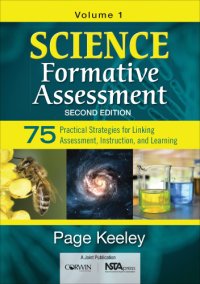
Ebook: Science Formative Assessment. Volume 1 75 practical strategies for linking assessment, instruction, and learning
- Tags: Creative ability in science, Curriculum planning, Effective teaching, Interaction analysis in education, Science--Study and teaching--Evaluation, Science -- Study and teaching -- Evaluation
- Year: 2016
- Publisher: SAGE Publications
- City: Thousand Oaks
- Edition: Second edition
- Language: English
- epub
And Learning (SAIL) Cycle; Stages in the SAIL Cycle; Engagement and Readiness; Eliciting Prior Knowledge; Exploration and Discovery; Concept and Skill Development; Concept and Skill Transfer; Self-Assessment and Reflection; Selecting and Using FACTs to Strengthen the Link Between Assessment, Instruction, and Learning; Chapter 3: Considerations for Selecting, Implementing,;Preface; Acknowledgments; About the Author; Chapter 1: An Introduction to Formative Assessment Classroom Techniques (FACTs); What Does a Formative Assessment-Centered Classroom Look Like?; Why Use FACTs?; How Does Research Support the Use of FACTs?; Classroom Environments That Support Formative Assessment; Connecting Teaching and Learning; Understanding Misconceptions in Science: Misconceptions About Misconceptions; Making the Shift to a Formative Assessment-Centered Classroom; Connections to Current State Standards, A Framework for K-12 Science Education, Next Generation Science Standards, and Literacy Capacities; Chapter 2: Connecting FACTs to Instruction and Learning; Integrating Assessment and Instruction; Assessment That Promotes Thinking and Learning; Linking Assessment, Instruction, and Learning: The Science Assessment, Instruction,;Explanation Analysis; 13. Fact First Questioning; 14. Familiar Phenomenon Probes; 15. First Word-Last Word; 16. Fishbowl Think Aloud; 17. Fist to Five; 18. Focused Listing; 19. Four Corners; 20. Frayer Model; 21. Friendly Talk Probes; 22. Give Me Five; 23. Guided Reciprocal Peer Questioning; 24. Human Scattergraph; 25. Informal Student Interviews; 26. Interest Scale; 27. I Think-We Think; 28. I Used to Think ... But Now I Know; 29. Juicy Questions; 30. Justified List; 31. Justified True or False Statements; 32. K-W-L Variations; 33. Learning Goals Inventory (LGI); 34. Look Back; 35. Missed Conception; 36. Muddiest Point; 37. No-Hands Questioning; 38. Odd One Out; 39. Paint the Picture; 40. Partner Speaks; 41. Pass the Question; 42.;A Picture Tells a Thousand Words; 43. P-E-O Probes (Predict, Explain, Observe); 44. POMS--Point of Most Significance; 45. Popsicle Stick Questioning; 46. Prefacing; 47. PVF--Paired Verbal Fluency; 48. Question Generating; 49. Recognizing Exceptions; 50. Refutations; 51. Representation Analysis; 52. RERUN; 53. Scientists' Ideas Comparison; 54. Sequencing Cards; 55. Sticky Bars; 56. STIP--Scientific Terminology Inventory Probe; 57. Student Evaluation of Learning Gains; 58. Synectics; 59. Ten-Two; 60. Thinking Log; 61. Think-Pair-Share; 62. Thought Experiments; 63. Three-Minute Pause; 64. Three-Two-One; 65. Traffic Light Cards; 66. Traffic Light Cups; 67. Traffic Light Dots; 68. Two-Minute Paper; 69. Two or Three Before Me; 70. Two Stars and a Wish; 71. Two-Thirds Testing; 72.;And Using Data From FACTs; Selecting FACTs; Selecting FACTs to Match Learning Goals and Standards; FACTs and Core Disciplinary Content; FACTs and the Scientific and Engineering Practices; Selecting FACTs to Match Teaching Goals; The Critical Importance of Classroom Context in Selecting FACTs; Planning to Use and Implement FACTs; Starting Off With Small Steps; Maintaining and Extending Implementation; 25 Way to Lead Learning About Formative Assessment; Using Data From the FACTs; Chapter 4: Get the FACTs! 75 Science Formative Assessment Classroom Techniques (FACTs); 1. A & D Statements; 2. Agreement Circles; 3. Annotated Student Drawings; 4. Card Sorts; 5. CCC--Collaborative Clued Corrections; 6. Chain Notes; 7. Commit and Toss; 8. Concept Card Mapping; 9. Concept Cartoons; 10. Data Match; 11. Directed Paraphrasing; 12.;Volleyball--Not Ping-Pong!; 73. Wait Time Variations; 74. What Are You Doing and Why?; 75. Whiteboarding; Appendix: Annotated Resources for Science Formative Assessment; References; Index
Download the book Science Formative Assessment. Volume 1 75 practical strategies for linking assessment, instruction, and learning for free or read online
Continue reading on any device:

Last viewed books
Related books
{related-news}
Comments (0)